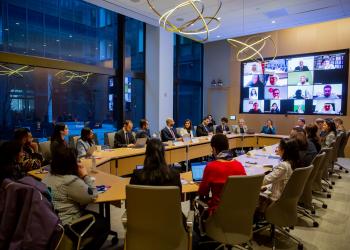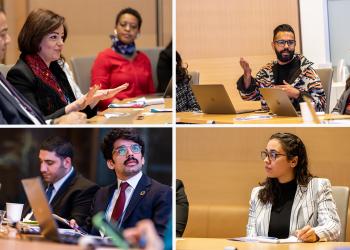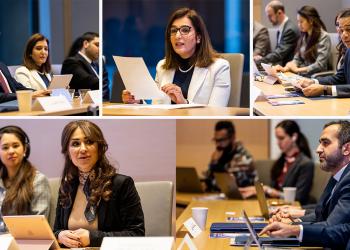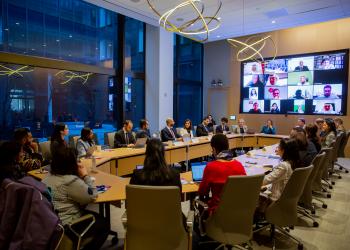Arabic BIC event explores equality and coexistence across Arab region
Issues of coexistence, gender equality, and technological development were at the heart of an Arabic-language event hosted yesterday by the Baha’i International Community (BIC), which drew speakers and participants from 10 Arab countries, including Bahrain, the United Arab Emirates, and Egypt, as well as Jordan, Kuwait, Lebanon, Oman, Saudi Arabia, and Yemen. The event was the first of its kind for the BIC in New York.
Titled “The Role of Equality and Coexistence in Enhancing Social Prosperity in a World Driven by Innovation and Digital Transformation,” the event was held at the BIC’s New York Office, in conjunction with the 67th session of the United Nations Commission on the Status of Women. It was organized by BIC delegates from Bahrain, Oman, and the United Arab Emirates, along with Hatem El-Hady, Representative of the BIC to the Arab region in Cairo.
El-Hady offered an opening overview of the BIC’s statement to the Commission, Values in Innovation: Women’s Engagement in Re-imagining Digital Technologies, available in Arabic and English, as well as other languages. “Technology can be a potent instrument in amplifying human capacity and connecting communities,” he said, quoting the statement. “Yet, like any tool, technology, and the spaces it creates, can be deployed in countless ways, yielding benefits or reinforcing existing inequities.”
Hatem Abdulhameed Hatem, Deputy Permanent Representative of the Mission of the Kingdom of Bahrain to the United Nations, who attended the event, highlighted rates of women in leadership in his country. He noted that women comprise more than half of the staff in Bahrain’s Mission to the United Nations, and emphasized the importance of highlighting examples of gender equality in the long history of the Arab region.
Event speakers explored various aspects of the intersection of equality and technology. Dr. Fawaz Al Shorooqi, a writer and educational specialist in Bahrain, emphasized the role of comprehensive and values-based education in equipping young people to navigate communications technologies in constructive ways. “Social media can undermine the values we work to instill in our children,” Al Shorooqi said. “We have to raise them in ways that empower them to deal with these messages—that enable them to differentiate between truth and false messaging, to hold fast to critical values of tolerance and coexistence.”
Roeia Thabet, Representative of Baha’is of the United Arab Emirates noted that, “The growing recognition of the unity and equality of man and woman is a defining feature of the modern age, and a herald of the gradual emergence of a global civilization.” This presentes humanity with a fundamental question, she said: “What are the beliefs, norms, and practices that societies will need to adopt over the coming years to fully and meaningfully establish gender equality?”
The role that civil society organizations can play in promoting values of equality and coexistence was emphasized by Mithaq Rohani, Vice Chair of the Baha’i Social Society in the Kingdom of Bahrain. Rohani explored civil society in relation to government institutions, the media, and the family, as well as the role of religious organizations in promoting interfaith coexistence.
“Civil society organizations have an important role to play in achieving the fifth Sustainable Development Goal, on gender equality and the empowerment of all women and girls,” he said. “Promoting values of equality and the enrichment of social prosperity is based on collective awareness that human diversity is a source of wealth and an essential pillar for any continuously developing and progressive society.”
Responding to thoughts offered by previous speakers, Mamdoh Alrouhani, Director of the Center for Social Prosperity Studies, suggested that technical development should be accompanied by progress in spreading and consolidating lofty principles that help build a renewed human civilization. “It is through these values that societies can discipline the processes of innovation and regulate the resulting technologies,” Alrouhani said.
The event was attended by more than 100 participants, including a range of civil society leaders from across the Middle East concerned about issues of technology and the status of women in the region. Among these was a representative of the Muslim Council of Elders, based in the United Arab Emirates.







